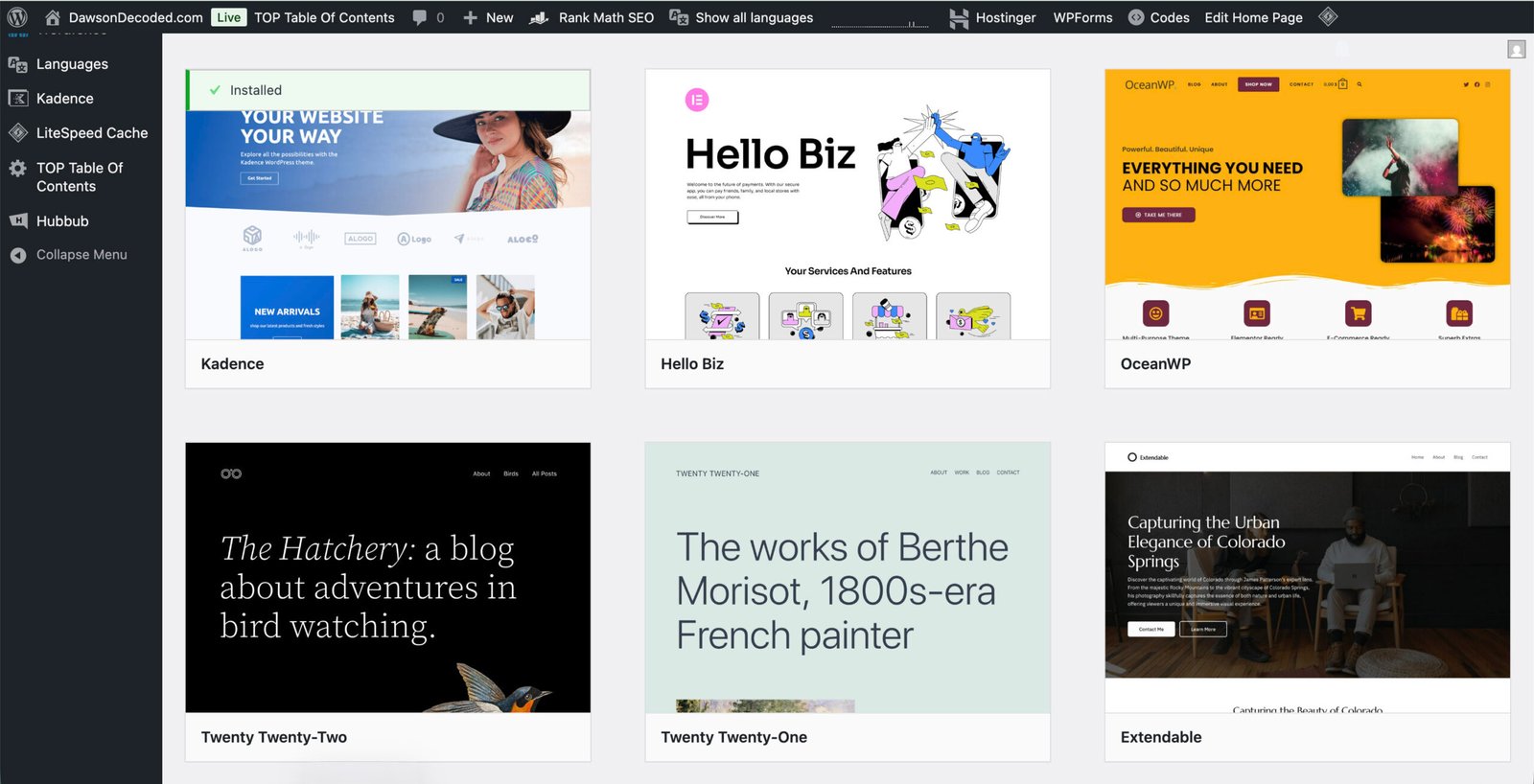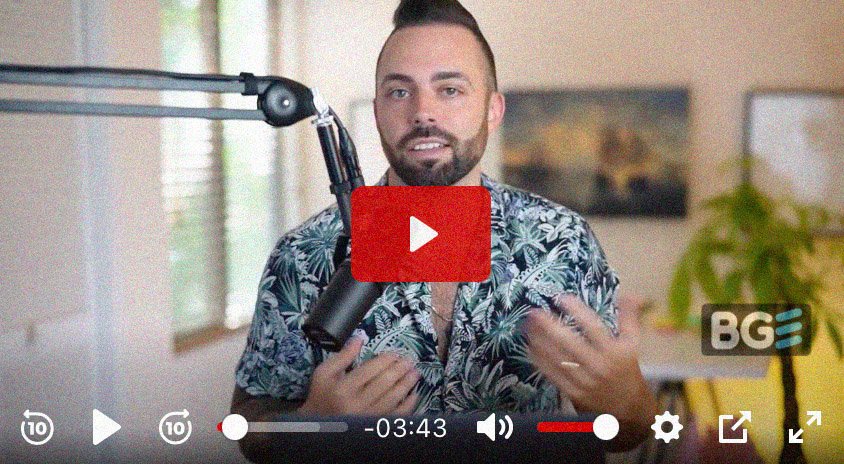Can you still make a living from a blog in 2025?
A significant number of people blog primarily because they hope to make a profit. That is their main motivation. And the admittedly rare success stories of bloggers (Adam Enfroy is often cited), fuel the notion that such a result is within reach.
Building wealth usually takes many years of effort. We are therefore all on the lookout for shortcuts that might let us get rich quickly and, ideally, with minimal effort.
Online, influencers use this powerful psychological trigger by holding out that possibility.
In reality, it has become very difficult to make a living from a blog. Competition is immense and income is often modest (see the statistics below).
According to my research, those who succeed:
- Treat their blog like a small business, with clear positioning and value proposition.
- Own their audience, develop durable channels (a YouTube channel, a long-standing online presence), and maintain consistent engagement on social media.
- Monetize primarily with offers they control (services, digital products, courses) rather than relying on unstable affiliate programs.
- Publish useful, original, and verifiable content on a regular cadence.
- Invest heavily upfront, then maintain: updates, email, and ongoing improvement of their offers.
- Diversify acquisition to reduce platform risk: SEO, Pinterest, YouTube, partnerships.
No miracle, just long-term discipline: serve your audience, own your channels, improve your offers, keep the pace. For those who succeed, “passive” mostly means they no longer do everything themselves; it is processes and people that execute.
For my part, I tried it for months… before throwing in the towel. My quality of life took a hit to the point it wasn’t worth it anymore. I now blog for the pleasure of writing. If I earn a little money from it, great, but my income comes from elsewhere. That attempt to make blogging a side gig convinced me it’s a full-time job, with no guarantee of significant income.

So why do we keep hearing about passive income from blogging?
Because many influencers suggest anyone can turn a blog into a passive income stream, and they recycle that promise endlessly. The dream sells; the reality less so.
In theory, for a blog, passive income would come from already-published content, monetized by methods such as:
- Affiliate marketing: commissions on recommended products.
- Advertising: AdSense and programmatic networks.
- Sponsored posts: brand content published on the blog.
- Digital products: eBooks, courses, templates.
- Subscriptions / community: members-only content, private space.
- Automated email marketing: sequences that point to offers and content.
- Behind-the-scenes services: standardized services sold via the blog.
In practice, nothing is truly passive. You have to acquire traffic, produce and update content, reply to readers, etc.
Over the years, I have invested part of my capital in rental property and in stocks (other forms of so-called “passive” income). But both options require substantial upfront funds and many years before they bear fruit.
The appeal of blogging, by comparison, is that you need very little to get started. But it also takes time, and the initial workload is considerable. On average, before Google’s AI answers rolled out in 2024, it took about two years to earn a little money, and twice that to reach a full-time income. It’s harder now.
The dream vs the data
Earning a comfortable income from our own work as self-employed is very enticing. It leads many to believe they can leave their day job behind. But the statistics paint a very different picture:

Key statistics
- Around 40% of Americans and nearly half of millennials have a side hustle.
- 6 in 10 side hustlers earn under $250 per month.
- Only about 10.5% make more than $1,000 per month, and just 1% exceed $4,000.
- Baby boomers (61–79) earn the most from side hustles at $441/month on average, while millennials earn the least ($112/month).
- Over a third (36%) spend 5–10 hours per week on their side hustle, while fewer than 15% put in more than 20 hours.
- Most people work on their side hustle in the evening (38%), with weekends being the least common time (though 15% still use them).
See sources at the end of this article.
Dating back from 2024, this data shows that more and more people are pursuing this path, which means more competition for bloggers too. You’re not just publishing into an empty space; you’re up against thousands of creators (see these stats for more details). Nearly half of these independent workers earn very little ($500 per month, for 5 to 10 hours a week).
Can you really succeed? And if so, how?
Launching a commercial blog requires a considerable upfront effort
Setting up online revenue streams takes time. You need to create content (which can mean months, even years, of unpaid work), generate traffic through various strategies that also demand time and effort, and sometimes invest money from the start (a computer, software, etc.).

Not everyone succeeds
Market trends and evolution, skills, instinct, talent, effort, persistence, and luck all play a role. This a long-term investment, with no guarantees.
Whatever niche you choose to enter, generating income will be long and difficult. For the vast majority of people, the lure of quick, easy recurring income is only a myth. Every sector is highly competitive and demands sharp professional skills. If you’re just starting out, plan to spend at least several months learning and experimenting.
Launching a blog is a long-haul endeavor. But for those who enjoy producing content online, it’s also a chance to build an audience. With a bit of flair, you may be able to turn your passion into profit (even a modest one) while keeping full creative control.
🎧
Prefer to listen? This topic is also explored in one of my podcast episodes:
Sources:
- Rachel Wells, Forbes: 5 Passive Income Ideas for 2024
Highlights practical ways to build passive income, including blogging, digital products, and investments. - DollarSprout: Side Hustle Report 2024 – Side Hustle Statistics and Industry Overview
Survey-based statistics on how many Americans have side hustles, how much they earn, and how much time they spend. - Nick Loper, Side Hustle Nation: 2025 Side Hustle Statistics and Survey Results – Income Levels, the Most Popular Gigs, and Common Struggles
Detailed breakdown of side hustle participation and earnings by generation, based on multiple surveys. - Self Financial: Side hustle statistics – Everything to know about side hustles
Report on income distribution, hours worked, and reliance on side hustle income across demographics. - SideHustleScience: Are Side Hustles Worth It? What The Data Says In 2024
Analysis of side hustle profitability, showing that only a small percentage earn above $10,000/month. - PYMNTS: 30% of U.S. Consumers Count on Side Hustles to Pay Bills (2024)
Consumer insight study showing how many rely on side hustles to cover essential expenses.
Great to have you here! Feel free to leave your thoughts in the comments.
Hello, I’m John Dawson, a graphic designer (for a little while longer) and the writer behind DawsonDecoded, where I share hands-on insights on AI, blogging, social media, and whatever else crosses my mind.”
Get new posts by email when they’re worth sharing.
No spam.
You might like:
Words that are mine
Reading Time: 2 minutesAfter months of writing mostly for algorithms and sales funnels, I stopped obsessing over online income and started writing in my own voice.
Eight months chasing a mirage
Reading Time: 3 minutesEight months in, I’m changing course. I’m going back to casual blogging and stepping away from the commercial / affiliate angle. The pressure’s off, and I finally have my life back.
How to start a blog and find your first readers (part 3)
Reading Time: 9 minutesMake it look and feel professional: pick a lightweight theme, set a basic brand kit, and publish the must‑have pages.
How to fact-check your blog post
Reading Time: 5 minutesFact-checking protects both you and your readers. This simple process allows you to separate facts from opinions, verify claims, and add safeguards so your published content remains accurate, credible, and trustworthy.
Blogging with AI
Reading Time: 4 minutesAI can speed up ideas, drafts, and edits, but it should assist rather than replace you. Keep your voice, verify facts, and add your perspective so posts stay authentic and useful.
How to start a blog and find your first readers (part 2)
Reading Time: 8 minutesIn Part 2 of this beginner’s guide, we move from idea to reality by getting your blog online. You’ll learn what domains and hosting actually are, and how to install WordPress in just a few clicks.
From BGE to “Launch to $10K”, Enfroy’s strategic shift signals the end of SEO-first blogging
Reading Time: 4 minutesAs of November 2025, BGE runs as a free masterclass and Enfroy funnels to Launch to $10K. With AI Overviews reducing clicks, commercial blogging is rarely a standalone model anymore.
How to start a blog and find your first readers (part 1)
Reading Time: 6 minutesLearn how to choose a blog niche you’ll love and a name that can grow with you, the first step in building a successful blog.
The dark side of online income: how scammers are using AI and social media to make millions
Reading Time: 7 minutesScammers use AI and social media ads to create fake funnels that mimic legitimate ones. This post explains how they work and what ethical marketers can learn.
Betting on yourself: why creating content will always be more profitable than playing the lottery
Reading Time: 8 minutesWhy blog instead of buying lottery tickets? Because the odds and the long-term payoff make content creation a far smarter bet for financial success.












Leave a Reply